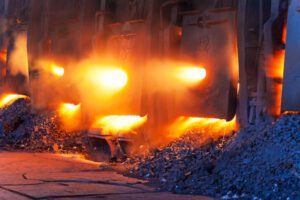
Unions seek £200m from ministers to safeguard Scunthorpe steelworks as blast furnaces face closure

Unions are calling on the UK government to inject £200 million into British Steel, in a last-ditch attempt to keep its two blast furnaces in Scunthorpe running until electric arc replacements can be brought online.
The trade union Community warns that without additional support, the rapid shutdown of Scunthorpe’s coal-fuelled blast furnaces could spark nearly 2,000 immediate job losses.
British Steel, owned by Chinese group Jingye, is already committed to installing cleaner electric arc furnaces (EAFs) in Scunthorpe. However, union leaders fear that the abrupt closure of blast furnaces, without an interim plan, will devastate Lincolnshire’s local economy and eliminate key steelmaking capabilities prematurely.
Roy Rickhuss, Community’s general secretary, described the plan as a “roadmap towards a just transition” and a way to avoid a “destructive cliff-edge” in job cuts. He believes government intervention to cover an extra £200 million in carbon costs, which are levied on large polluters, could keep both blast furnaces running and maintain income streams until EAFs are operational.
Syndex, the consultancy commissioned by Community, backs the union’s case. It argues that government support to fund the short-term costs of carbon is the only way to make operating both furnaces “financially viable.” Maintaining just one furnace or closing them both would prove too costly, Syndex warns, especially considering the high fixed costs and potential loss of critical raw material access.
The request follows a separate move by the government to provide around £500 million to India’s Tata Steel for upgrading the Port Talbot plant in Wales, a deal that included the closure of its blast furnaces there, costing 2,500 jobs. Ministers have pledged up to £2.5 billion in further support to help decarbonise the UK steel industry, but details remain vague, and it is unclear how much might go to British Steel.
Business Secretary Jonathan Reynolds has signalled a desire to “champion decarbonisation without deindustrialisation,” launching a consultation on the UK’s steel strategy. Yet a cocktail of global forces—such as a steel glut fuelled by China’s construction downturn and the 25% US tariffs on steel imports—threatens to depress prices further, complicating British Steel’s switch to greener operations.
While EAFs produce significantly less carbon dioxide compared to traditional blast furnaces, they require extra facilities to convert iron ore for steelmaking. Such infrastructure is not yet established in the UK at the necessary scale, fuelling fears—particularly among some politicians and defence officials—that the country could lose a core manufacturing skillset if Scunthorpe’s blast furnaces are mothballed.
Despite these concerns, the Trades Union Congress (TUC) says moving quickly to modern, cleaner technology is “vital” if UK steel is to remain globally competitive. “It’s essential we continue to produce steel in Britain, and decarbonising is the only way we can do that in the long term,” insists TUC general secretary Paul Nowak.
For now, British Steel acknowledges that government talks are ongoing, emphasising that its “trade union partners will be an important part of that future.” The question remains whether ministers will agree to pump in a further £200 million, with Community and Syndex arguing it is the only strategy that will save Scunthorpe from large-scale redundancies and maintain a fully functioning domestic steel industry until greener technology is ready to take over.
Read more:
Unions seek £200m from ministers to safeguard Scunthorpe steelworks as blast furnaces face closure
